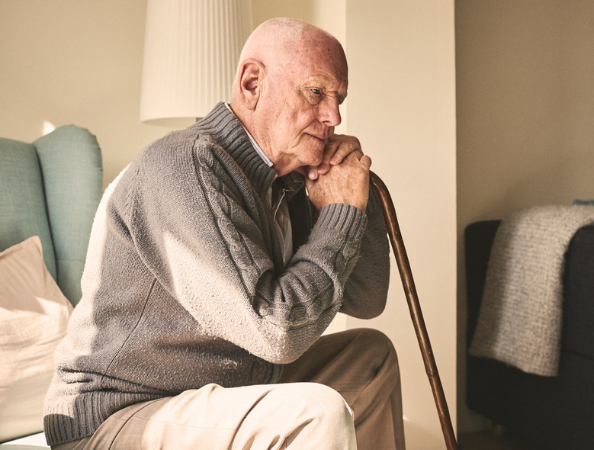Political instability and pollution are accelerating your aging, science says.

Reaching old age in better health is an increasingly common concern. To achieve this, scientists—and ordinary people—are asking, among other things, how to slow not only physical aging but also brain aging , and what factors could be causing more rapid decline. In this regard, an international study published in Nature Medicine reveals that our environment—including pollution, social inequality, and weak democratic institutions—significantly accelerates the aging of our life expectancy.
This study—led by a multinational team from Latin America, Africa, Europe, Asia, and North America —analyzed environmental, social, and political factors and their impact on brain aging using advanced artificial intelligence and epidemiological models . The results show that where you live—and the social factors you're exposed to there—may be contributing to you aging several years faster, increasing your risk of cognitive and functional decline.
These findings came after analyzing data from 161,981 people in 40 countries using a methodology that shows how multiple exposures can predict biobehavioral age gaps (BBAG) , a new metric that assesses accelerated aging.
According to researchers, BBAG is the difference between a person's chronological age and their "predicted" age based on protective factors (such as education, cognitive skills, functionality, exercise) and risk factors (cardiovascular disease, diabetes, hypertension, sensory deficits, etc.) .
“A positive BBAG indicates accelerated aging; a negative one indicates healthier aging. This metric allowed us to develop an age gap measure for each subject, and then we evaluated how social, environmental, and political exposomes explained this aging gap,” Agustín Ibáñez, corresponding author of the study and researcher at the Latin American Institute of Brain Health, explained to EL TIEMPO.
According to Ibañez, the study allowed them to identify that exposure to adverse sociopolitical conditions—such as low political representation or lack of free elections—poor air quality, and structural inequality are associated with a very significant acceleration of aging . According to the results, these conditions can translate into a biobehavioral age that is, on average, 5 to 6 years older than the chronological age in affected populations.

Poor air quality is linked to faster aging. Photo: iStock
While no single factor stands out above the others, the researchers point out that the combination of social inequality, political instability, and pollution is particularly damaging. "No single factor stands out completely. The study shows that all have similar and cumulative effects. Sociopolitical factors (such as lack of democracy) have moderate to large effects, comparable to those of physical factors such as air quality and social inequality. The key is that their effect is synergistic: the combination of several of these risks increases accelerated aging much more than any one factor alone," Ibañez points out.
The work presents the first solid evidence that structural exposures, beyond individual lifestyle, are deeply rooted in our aging process. "Our biological age reflects the world we live in. Exposure to toxic air, political instability, and inequality not only affect society but also determine our health," Ibáñez notes.
Several types of exposures were linked to more rapid aging: physical factors, such as poor air quality; social factors, such as economic inequality, gender inequality, and migration ; and sociopolitical factors, such as lack of political representation, limited party freedom, restricted voting rights, unfair elections, and weak democracies. Importantly, higher BBAGs were associated with real-world consequences: they predicted future declines in both cognitive abilities and daily functioning. People with larger age gaps were more likely to experience significant losses in these areas over time.
“Whether a person ages healthily or rapidly depends not only on their individual choices or their biology, but also on their physical, social, and political environment, and these effects vary greatly from country to country,” says Sandra Baéz, a professor at the Universidad de los Andes and co-author of the study and an Atlantic Fellow at the Global Brain Health Institute (GBHI) at Trinity College.
According to the researchers, these results come at a critical moment, when democracy is in decline, pollution is reaching crisis levels, and the inequality gap is widening. "This is not a metaphor: environmental and political conditions are leaving measurable traces in 40 countries, revealing a clear gradient of accelerated aging from Africa to Latin America, Asia, and Europe," said Hernán Hernández, the study's first author.
Latin America and Colombia Europe had the healthiest aging, while Egypt and South Africa showed the most rapid aging. Residents of Asia and Latin America were in the middle. In Europe, eastern and southern countries aged most rapidly. Globally, faster aging was strongly linked to lower national income levels.
However, the researchers note that Latin America presents a worrying pattern. " Latin American participants have significantly higher BBAGs compared to Europe and Asia ," Ibáñez comments. "Specifically, in the country-by-country meta-analysis, Colombia is among the countries with the most accelerated aging in the region, reflecting both social inequalities and exposure to adverse political and environmental factors . This coincides with the high burden of chronic diseases and social inequalities in the region," the researcher explains.
This study redefines healthy aging as an environmental, social, and political phenomenon. Therefore, the researchers argue that public health strategies must go beyond lifestyle prescriptions to address structural inequalities and governance deficits.
For Hernando Santamaría-García, co-author and member of GBHI, “governments, international organizations, and public health leaders must act urgently to reshape environments, from reducing air pollution to strengthening democratic institutions.”
While, at the individual level, experts recommend maintaining physical activity, taking care of hearing, cardiovascular health, and participating in cognitive activities as important protective measures , the study emphasizes that real solutions require structural changes, such as improving air quality, reducing economic and social inequalities, and, especially, strengthening democracy and political stability. “These actions can reduce chronic stress and biological wear and tear (allostatic overload) that accelerate aging,” Ibañez concludes.
eltiempo





